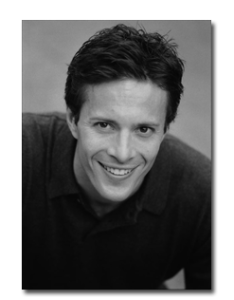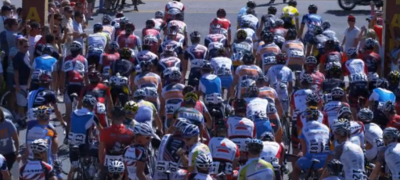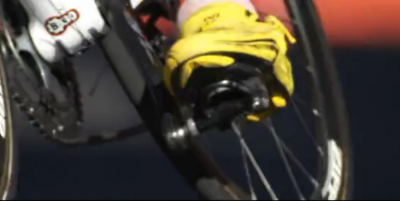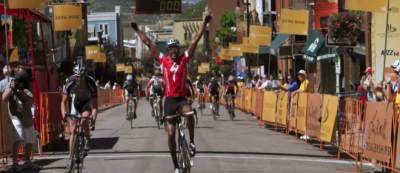By: debbie lynn elias

John Lawrence is not your typical filmmaker. Making his freshman appearance as a writer/director, Lawrence, a Salt Lake City physician, takes his own passion for the sport of cycling, kicks it into high gear by delivering a simple easy-going story set in the world of amateur cycling, adds authenticity and understanding of the sport and the human condition, fills the screen with some solid performances and caps it off with some of the most beautiful visuals you’ll see on screen this year in independent film thanks to veteran cinematographer Geno Salvatori and editor Matt Black. A poignant and beautiful gem. A journey of discovery. THE CYCLIST.
With a likeable cast led by KC Clyde, this is essentially, the coming-of-age story of Nash, a late 20’s/early 30’s down on his luck slacker who loves cycling but can’t seem to grow up and exist in the “real world” and still bike. Likeable almost to a fault, itfs hard not to root for Nash to get his life together. Losing his girlfriend Kate [Jennifer Klekas] because of his immature lifestyle, he seeks support and solace from his best friend, Jack [K. Danor Gerald] and his girlfriend Bianca. Pushed to accept responsibility, when real adversity strikes, will Nash step up and find redemption or fall to the back of the pack?
I had a chance to speak with Lawrence in this exclusive 1:1 interview and talk about not only THE CYCLIST, but the experience of being a first-time filmmaker and the potential albatross of releasing a cycling film in the wake of the Lance Armstrong scandal. As affable and engaging as the character of Nash, Lawrence’s passion for filmmaking outshines the passion of even the most ardent sportsman.

Obviously in light of recent circumstances in the cycling world, cycling could use some positive influx.
You never know. The only thing better than good publicity is bad publicity. The sport has certainly taken a few knocks. But one thing our film tries to look at is the excitement of amateur cycling. The love of the sport is so much more than what’s in the news these days.
Why does somebody want to do a film about cycling and those little spokes going round and round and round, and your knees getting more tired by the second, and a very uncomfortable butt?
[laughing] Well put! Somebody should really look into that, the psychology of why anybody would want to do it! I rode bikes myself but I was more known for falling of them and waking up in a hospital more than anything else. I always thought that making a film about it, the aesthetics, always appealed to me. It was something that when you‘re in the middle of one of those races or training with friends, there‘s such a joy to it. Amidst the suffering, there is some real beauty and just the sound, the noise, the camaraderie. It‘s something I thought that if you could capture on film, could really be quite exciting. That said, watching a bike race, I guess, would do the same thing but trying to find a story to go with it was the tough part. And actually, what you brought up was one of the challenges when I first was with our Director of Photography [Geno Salvatori]. “How are we gonna capture that? How are we going to visually capture the pain of the bikes and those knees that hurt?”, like you just said.
Your cinematographer, Geno Salvatori, his work is just magnificent. The two of you have put together some of the most breathtaking sequences using some beautiful dissolves. You‘ve got very scenic locale but then some of the lensing is very creative in both the camera angles and the technique. But then there’s also the lighting and using that bright sunlight natural light.
Thank you very much. That was truly one of the gifts of the film. Being a first time filmmaker, every aspect was an obstacle. So I talked with some different DP’s and within a one or two week period, several people all mentioned Geno’s name to me. It was one of those little confluences here, “I think I need to pay attention there. The universe is trying to tell me something. I think I need to contact Geno.” And he just walks in and instantly he’s got this charm and endearment. He just embraces you in such a great way. We talked for a long time. Gave him the script and thought, “Wow. If he could come on board it would be such an amazing boost to the film.” I basically just asked him, “How can we get you to do this?” When he said “yes”, and he was willing to work with us for the lack of funds that we had, it was like music started playing in the background, Beethoven’s Ninth Symphony, [and] “we’re gonna make this film now.” And because of Geno being on board, a lot of the crew were happy to work just knowing Geno’s talents. On a daily basis our gaffer would remind me that Geno’s eye should be registered with Christiefs or something. He’s just an amazing guy to work with.
You mean they didn‘t all want to come on board just to work with you as a first time director? [laughing]
I think they were all lined up for awhile. [laughing] Right when we were trying to film was when John Carter from Mars was filming here in Utah, and then 127 Hours, and then another show with a bunch of A-list people, so we would have people on board and all of a sudden they would get picked up by the next film.
You mean the more “economically feasible” films?
Yes! Something like that. But it all worked out the way it was supposed to. With the people that came on board, eventually it felt like we were really lucky, with the production phase at least, so many people were people that were excited to be there and we had a really wonderful group.
Was it always your intention to direct as well as write the script?
Yes, and no. When I first wrote it, I wasn’t thinking so much about that. There were discussions of, “Was it more important just to get it made? Would I want to even act in it.” But as time passed, I really thought this my chance to make my first film. You realize, nobody is just gonna give you a feature to direct never really having done anything before. So, yea, it became more of a goal for me for this to be just a first film.
So, how did you approach this? Did you start seeing images in your head? Shot listing? Storyboarding? Or did you come up with imagery once you started talking with Geno as to how to visualize the words on the page?
It’s interesting now, having gone through the process. . I look at all my script writing. So much has changed and improved. Now I go about things differently. For me, this was kind of Film School 101. The lessons of how to write become so much different. Now I notice with my script writing it really is a matter of that you do think much more ahead. Not just what’s realistic and feasible, but what makes more sense and visually what will work. You think more ahead of that. At the time I certainly all sorts of wonderful ideas and images in mind. I started playing with shot lists. Then Geno, again, truly a gift to the film, took a ton of time. We sat and sat [with] weeks of conversations going through every scene, what the scene meant, what kind of shots we wanted, what wefd be aiming for, which of course changes one you actually get a location. So Geno was again an amazing teacher and collaborator on the film in trying to achieve the vision we both had. It was really a lot of great fun.
Hand in hand with that visual vision and the emotional vision that comes with that are your actors. KC Clyde is so affable, so likeable. He‘s got a Jason Segel quality to him and you really gravitate towards him as Nash.
I can’t say enough good things about KC. As the writer/director, I know [there are] great flaws in the writing, and it was a really interesting character to catch so much in the script and in some ways be likeable guy. Some guys when they auditioned played [Nash] with angst and anger and that type of attitude. KC, I think, really caught that was a front for this guy and there’s sort of an affability, a humor, everything hefs covering and a vulnerability. We went to LA and auditioned a bunch of people. KC knew we were in town called and said, “Hey can I audition?” He was the last person to walk in and just gave an amazing audition. Just nailed it. You kinda go, “Well, he knows exactly who this person is and more than anything he’s just the nicest person to work with. He’s the guy on set who says hello to every single person at the beginning of every day and goodbye to every person and thanks them all at the end of every day, just again, an amazing collaborator and really, just a wonderful person.
How long ago did you finish the editing of THE CYCLIST? Was it before the Lance Armstrong scandal? You do have several nods to him in the film.
I know! [laughing] We talked about this. “Do we change this? What do we do?” We finished editing. . . 2012 before he really. . . In the cycling world, it was debated back and forth and everybody just assumed [forever], so that wasnft really a part of it. But, there was that discussion, “Do we do anything with this?” At some point it’s being left in. Once the distributor had it, Image had it, they decided, “No, we’re not changing anything. We don’t want to go back in and re-do anything.”
In a sense we’ve had these discussions, and as much as what Lance did was so terrible to so many people in some ways, he did more for US cycling , has raised more money for just pushing the sport forward – the sport is in a different place than it was 10 years ago because of what he did and that won’t change – so I guess there will be some good eventually and all will be forgiven and the sport will move forward.

How active a cyclist are you?
Amateur racing here in town. You get a little bit addicted and you head out with your friends 5 or 6 days a week and still just ride. I had a bunch of crashes that made me a little bit more wary so I stopped racing all together after waking up in the hospital a few times. I do it more for fun. Get the kids in the back of the stroller and got for a ride.
You bring that into the film with the character of Jack, and also with Nash. You have falls and the worst possible outcome of a fall.
Yea. In cycling they say regarding crashes, there are “those who have and those who will.” Unfortunately it’s part of the sport. The fact that that happens, people still have such a passion for the sport, they still go it. In earlier versions of the script, the script was structured around the Ode to Joy. There are different parts of life that wasn’t working, he was kind of reflecting back on the different parts of his life that weren’t working after he’s lying there on the road after a crash. And there’s this large CRASH!! And the Ode to Joy meant to wake you up. That’s kinda what this crash was supposed to represent in his life. In a sense this crash is to say, “Hey! Pay attention to life. Pay attention to what’s really important here.” And remind you to wake up a little bit.
One of the interesting thing that comes across is not only the camaraderie among the cyclists that is even more than just friendship, but also the generosity of spirit, even among competitors, and you really bring that to fruition with the character of Graham [Thomas Plustwik]. It really humanizes and touches the spirit in everybody.
Thank you that you picked that up. I think that’s one of my favorite scenes. Like you said, it kind of humanizes him. I think it’s one of the things we all love about sport. You watch games and when you have those moments of sportsmanship in anything, I think that‘s what touches us and you have those little tearful moments when we realize, “Hey, it‘s bigger than who we are as humans“, and it’s so much bigger than the sport is but it’s the sport that at the same brings us together. Certainly among cyclists, its an odd group of people. It’s an individual race but still they’re all racing together so there is a certain camaraderie just of what they’re doing. I see that in a lot of sports. I think [it’s] respect. People respect the sport and it comes out of respecting each other. It‘s a good thing.
What was your shooting time on this?
Principal photography was an 18 day shoot.
Then, we took another 6 days in the Fall to do a few make-up shots and did all the shooting down in Southern Utah in 3 days.
Was it difficult to get permission to shoot? I‘m assuming it wasn’t too hard to find cyclists.
Actually that was probably the hardest part. [laughing] Knowing the community here and cyclists, I thought we’d certainly get some people to come out and help us out and ride their bikes. But to get cyclists to sit still on a film shoot and be waiting around for the next set up and do this and that, is almost impossible. They’d show up for an hour here and then disappear and some other guys would come back. I remember at one point we had one of the big finishing scenes. The whole area is dressed up. We’ve got the start line. It looks beautiful and I look down at what’s supposed to be a 150-200 person pelotone and there’s 6 people. I’m smiling but I just wanted to cry. Smiling on the outside but thinking, “Okay somehow we’ll make this work.” Pulled a few people out, some extras, some crew people and put bike jerseys on them and used some movie magic with some other bike races that we were able to film.
Well, independent film is the mother of invention!
It‘s great fun! We‘ll make it work. We know we will. And it did! Great learning!
What did you personally take away from this experience of making THE CYCLIST or learn about yourself?
It absolutely confirms my love of filmmaking. Despite people [saying], “You must be having a great time. Youfre doing what you said you wanted to do.”,itfs 99% just hard work and frustration and no sleep and at the same time I love it more than anything else I‘ve ever done in my life. Just felt so at home. I gained some confidence in the learning and you realize the people you want to work with – those who were there to work with you and those who weren’t. That’s a question I could go on with. I think every step of the way, from writing to directing to producing to editing, acting, so many great lessons to learn from. But I think I walked away with a little bit of confidence. And then you get to the distribution phase, and it’s…..then it depends what hour of the day you ask me. [laughing]
What are you working on next?
We’re working on a combination with distribution side here and international distribution on THE CYCLIST. This is great and it led me to some other people. I said to some people, “Next one I make will not have biking.” So, I started working on a bunch of scripts and then somebody came along and said, “Hey, we’ve got the rights to this book. It’s about these kids in the 1950’s and it involves a bike. We know the film you were just working on. Are you interested?” I‘ve written a script for them and they‘re looking at me directing as well. We’re kind of in the fundraising part of that script. I’ve got four other features that I’m working on actively right now – all variables – romantic comedies, historical fiction, some are more drug thrillers, one’s more of a mid-eastern thriller, and then a tv show I wrote based on my time working in a medical clinic in the mountains, and a book I wrote on going through medical school and residency.
Going through medical school and residency, it does come in handy when you do cycle and fall down.
[laughing] You know who to call!

John, again, the film truly is beautiful. A subtle, beautiful little film. The cinematography is breathtaking. Sweet, serene, sun-kissed moments by a lake, beautiful imagery of just the spokes of the wheels meshing together with hundreds of bikes. Absolutely stunning. Such a wonderful tone, visual tone, that picks up KC’s really great performance.
Thank you. I’m excited to share that with them. Those guys put in some much into the films and give so much of themselves to their craft.
#











